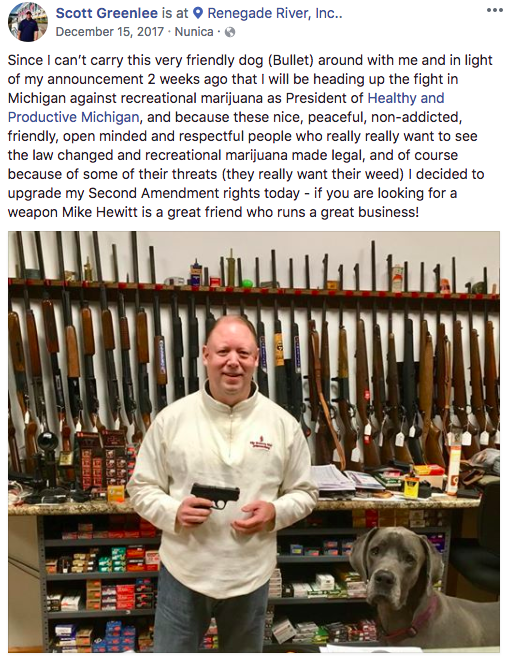
Every state with legal cannabis has been met with fierce opposition. In most cases, the opposition refuses to divulge their true motives. They prefer to stick to the classic “think of the children” spiel as if legal weed means dispensaries will have “kids only” days where they hand out THC gummies to middle schoolers. You know, like how the neighborhood bar hosts happy hour for the after-school latchkey crowd.
Here in Michigan, it was recently confirmed that recreational cannabis will be on the midterm election ballot this November. The opposition has been surprisingly quiet, but it’s there. All we know is that so far it’s an organization called Healthy and Productive Michigan, which is run by Scott Greenlee:

In the few interviews and debates he’s done, some of Greenlee’s biggest concerns for legalization include:
- Rising unemployment due to failed drug tests. (Colorado has the lowest unemployment in the nation)
- That the revenue won’t do anything to fix Michigan’s roads, because the lottery is another vice that goes toward our roads and it has not yet single-handedly filled Michigan’s $1.4 billion road budget so it has obviously failed. (Colorado made $247 million in tax revenue from cannabis last year. Would you rather see that go toward the road budget or the black market? I know what I’d pick)
- That cannabis is a gateway drug. (there’s a 14% reduction in opioid prescriptions in states with legal access to cannabis because in many cases, it’s an effective alternative to addictive prescription painkillers)
- That this will put more pot in the hands of kids. (you have to be 21 to enter a dispensary)
Greenlee is a former aide to Michigan Attorney General Bill Schuette, who led the opposition against Prop 1 in 2008. As AG, Schuette has released 4 official opinions on pot (out of 14 official opinions total) and has stated that law enforcement officers have the authority to arrest a patient, seize their product, and let the courts decide whether the person has committed a crime. Officers were also told they’d be committing a crime if they later returned product seized from patients who were found to be acting lawfully (where do you think that product goes?). Oh, and Schuette is running for Governor this year.
Greenlee’s bottom line with Healthy and Productive Michigan is to make people afraid of cannabis so they will vote no in November. I’m just not convinced that it’s for ANY of the reasons he says. But that’s the problem – he’s not trying to convince me, or anyone like me. He’s taking a page from Donald Trump’s book of “Bloviate all Over the Campaign Trail and Aggressively Deny Reality”. If yelling and denial can get you elected president, surely it can work when you’re defending corporate interests and pandering to people who want a reason to believe cannabis is as dangerous as heroin (it’s not, sorry).
So if guys like Schuette and Greenlee don’t actually care about any of this, why are they so anti-pot? Obviously it’s money, but whose money? You won’t get an answer from either of them, but the money is likely coming from the same groups that fund anti-legalization efforts in every other state:
Pharmaceutical Companies
In 2016, Insys Therapeutics donated $500,000 to Arizona’s anti-legalization drive, citing “concerns for child safety.” Insys Therapeutics manufactures Subsys, a prescription spray derived from the opioid fentanyl. Subsys is 100 times more powerful than morphine. Questionable marketing campaigns have led to criminal charges against Insys employees. Employees convinced insurance companies to cover Subsys for patients who had no medical need, and more than a billion dollars worth was sold in 5 years. Here’s an excerpt from the United States’ case against Insys:
“The United States alleges that Insys, headquartered in Arizona, paid kickbacks to induce physicians and nurse practitioners to prescribe Subsys for their patients. Many of these kickbacks took the form of speaker program payments for speeches to physicians that were, in fact, shams; jobs for the prescribers’ relatives and friends; and lavish meals and entertainment. The United States also alleges that Insys improperly encouraged physicians to prescribe Subsys for patients who did not have cancer, and that Insys employees lied to insurers about patients’ diagnoses in order to obtain reimbursement for Subsys prescriptions that had been written for Medicare and TRICARE beneficiaries.”
Earlier this year, Insys Therapeutics obtained DEA approval to manufacture synthetic marijuana.
Police and Prison Guard Unions
The Coalition for Responsible Drug Policies was founded by a police chief lobbyist in California, which led the opposition to legalization. Donors included the California Police Chiefs Association, Los Angeles Police Protective League’s Issues PAC, California Correctional Supervisors Organization, California Teamsters Union, and the California Hospital Association. When you profit off arresting people and the money seized is distributed amongst precincts, it’s easy to oppose the legal commercialization and consumption when it means the money no longer goes to you. (Oh but don’t worry, they’re still finding ways to get their cut).
Private Prison Companies
Private prisons are problematic for, well, every reason, but mainly because their bottom line is keeping beds full, which means they need as many reasons as possible for people to get arrested. More federal marijuana prosecutions mean more federal drug offenses, which means more prisoners and more money in their pockets. As president, Obama had signed a memo to phase out the federal use of private prisons to prevent them from profiting off predominantly poor and/or black communities, which was quickly reversed under the Trump administration by Attorney General Jeff Sessions, who is known to have close associations with GEO Group and CoreCivic, the two largest private prison corporations in the country. Two of Sessions’ former Senate aides are now lobbyists for GEO Group, specifically dealing with federal government contracting. So far it all seems to be working because a month after Sessions rolled back Obama’s protections, GEO won a $110 million contract to set up an immigrant detention center in Texas.
Anyway – since 1989, GEO Group and CoreCivic have spent millions lobbying against marijuana reform because it would affect their bottom line. I can’t imagine why.
Alcohol Companies
A couple years ago, WikiLeaks revealed a Wine & Spirits Wholesaler of America plea urging Congress to keep a tight leash on legal marijuana for concerns over drugged driving. The Beer Distributors PAC, which represents 16 beer distributors in Massachusetts, gave $25,000 to anti-legalization efforts.
What about Michigan?
As far as whether or not this is accurate for the Healthy and Productive Michigan campaign, it’s unlikely we will ever find out for sure unless we get ahold of some tax filings (Greenlee has not responded to emails and blocked Jane Dope on Twitter when asked if he had a website a few months ago. No wonder he needs a gun!). All he’s said before is that it’s a mix of “business, faith, and law enforcement organizations”. The only op-eds I’ve found supporting Healthy and Productive Michigan are written by a surgeon and a Sheriff, so… eh, it’s probably all a coincidence.
What everyone needs, on both the pro-pot and anti-pot side, is for people to take its inevitability seriously. It’s been prohibited for less than 100 years for some silly ass reasons, and we’re ready to take it back. Remember, this is a plant that’s been used for thousands of years in ways completely unrelated to psychoactivity. It’s about so much more than “getting high.” We need clinical trials to better understand the good (AND bad) ways the plant affects our bodies and health. We need accurate testing for THC toxicity in drivers so we’re not arresting people for “driving while high” because of a joint they smoked 2 weeks ago. These anti-pot guys could spend their time helping to advocate for solutions that will solve their concerns and mitigate the risks of allowing people to consume more freely, but unfortunately, that’s not in their best interest. Hopefully, the people of Michigan see through it.